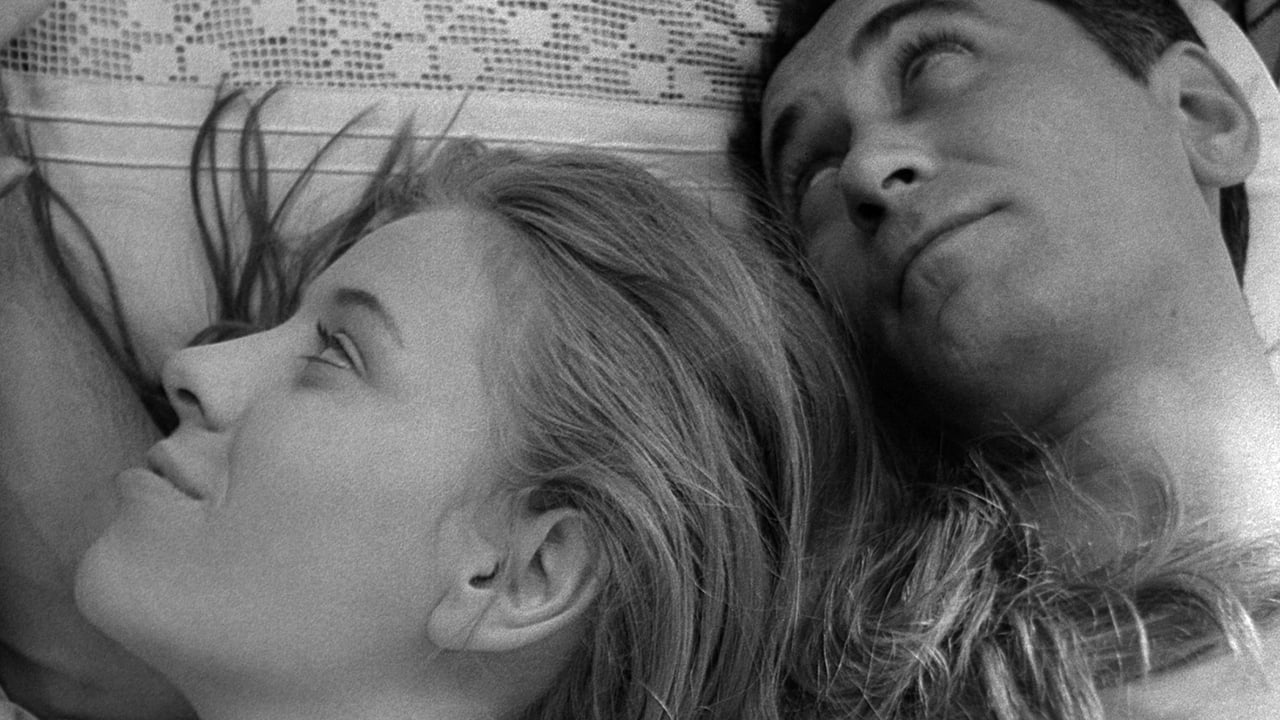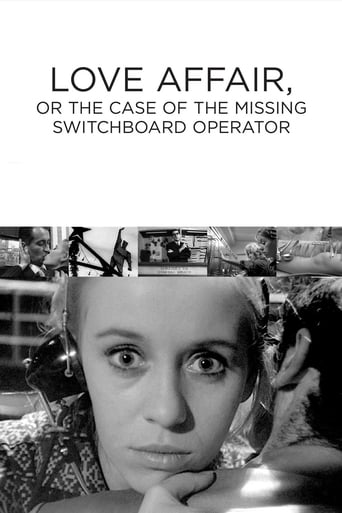

Good start, but then it gets ruined
... View MoreIt’s fine. It's literally the definition of a fine movie. You’ve seen it before, you know every beat and outcome before the characters even do. Only question is how much escapism you’re looking for.
... View MoreThis film is so real. It treats its characters with so much care and sensitivity.
... View MoreStory: It's very simple but honestly that is fine.
... View MoreTo me, the story is lousy and boring, and dialogues, monologues and narrators are catastrophic. The only thing worth seeing in this movie is Eva Ras. She was really pretty girl in her youth, and this is the first Yugoslavian film with explicit nakedness. The scene in which the black cat is lying on Isabel's naked body is known not only within domestic but also the world cinematography.3/10
... View More"It's been two months since I've been with a man – and that's a long time for a Hungarian woman." – Eva Ras, professional HungarianAnd then Aligrudic mentions that his colleagues at work constantly make jokes about easy Hungarian women. I wouldn't be surprised if Eva had suggested this part for the dialogue. Not that she is proud of her heritage as much as her whoritage.A scandalous film at the time, features for the first time a nude actress in a YU movie, and I mean completely nude – and in lots of scenes. The only reasons any sane person would want to check out this laughably pretentious "art" film are: the time-machine factor of watching an old YU movie (the nostalgic factor), and of course the opportunity to see what Eva looked like half a century ago – and in the nude. And there sure is a lot to see; she had a great body, especially the boobs. There is so much nudity in this 60s flick that some western censors wanted to play this in sex theaters.It turns out that Aligrudic didn't kill Eva intentionally but sort of accidentally bumped her into the well after she'd been literally flinging herself onto him for a while in what is a tremendously stupid scene. A totally idiotic "plot-twist" that sort of neatly wraps up this pointless art-crowd mediocrity written/directed by an overrated "artiste" who undoubtedly knelt in front of his Bunuel and Fellini posters for years before finally getting a chance from the Communist Party of Yugoslavia to do his own crap. (Is that why there are totally irrelevant scenes with Marxist imagery? You bet.) It was quite obvious that Aligrudic "killed" Eva, but this never was meant to be a whodunit. It's more of a hudinit – a phony magic act intended to sell random themes meshed together as art.Aligrudic falls into an alco-depression when he finds out that Eva is pregnant – and that she doesn't want the kid. And who could blame her? The kid is either from Aligrudic or Ljuba Moljac; either way she loses. I mean, have you seen Aligrudic's real son? He is a carbon copy of the actor; a top-tier Serb politician, a corrupt liar, a former member of the country's ruling Far Right party called DSS. I have personally seen that man stumble around Vracar (downtown Belgrade) in a half-drunken stupor, which has a kind of poetic irony to it. (His party is infamous for its barfly "intellectuals".) Did Eva get pregnant from Moljac or from Aligrudic? Did Aligrudic find out that the kid may not be his? We don't know the answer to any of that, because the director is far more concerned with urgent matters – such as giving the viewer a history of the European grey rat, and a "reminder" that "even Rembrandt drew the sexual act". Somehow all of this is connected to rats and sex. Yes, rats have lots of sex, "one rat-pair produces 1000 in a mere year", we are told. And this connects to Eva's life and murder how exactly?There are many art-fart BS scenes in this vague movie. Scenes and sub-themes are thrown in almost randomly, and the viewer – afraid that he might embarrass himself that he didn't "understand" the movie's point – has no option but to conclude how good the movie was, despite being confused by it, and despite maybe not even liking it. THAT is how wannabe "art" films function: they BLACKMAIL the easily bullied viewer into declaring the movie a success. It's peer pressure, that's all it is, just like on a school playground.Eva Ras is tailor-made for these kinds of indefinable, plot-free, weird-for-the-sake-of-it roles, because she doesn't have to act in the literal sense of the word. Her breasts do the talking in this kind of a film, while her synchronized mouth and the irrelevant stuff that comes out of it is subjected to a supporting role. The director is more concerned with throwing in stories about rats and Rembrandt, or speeches by college professors – whose mere presence somehow isn't supposed to make this movie more stupid than it already is. The director isn't really interested in characterization. We don't really find out that much about them. Maybe Eva and her boyfriends are a metaphor for rats? Look, give me a break, I'm doing my best with the guesses. Eva's trademark moronic and insincere smile somehow suits these kinds of superficial-character portrayals. Give her a role in a proper movie with proper characters, and she is lost; she has no clue how to play them so usually she ends up reciting the lines like a robot. She's a bad actress.The only reason I didn't give this nonsense less than a 4/10 is because it has that nostalgia factor that I spoke of. If I'd seen this back when it was released, I would have found it insufferably dull – aside from the nude scenes. Don't kid yourselves; there is no plot here to speak of. This is the type of director who is much more concerned with international notoriety and respect, with getting nominated for dumb awards at dumb European film festivals than providing the viewer with a proper finished product. Which one of you thought that watching Eva prepare and serve a meal was exciting to watch? Did anyone experience spontaneous cinematic orgasms from watching a boiler being installed in a bathroom? I assume you've prepared meals yourselves, right? Perhaps you even had the amazing privilege of watching the installation of a boiler, and in even more detail! Those are all irrelevant nonsensicalities we get from film-makers too lazy or incompetent to get down and dirty and create a story worthy of the big screen. Lars von Trier, yes, that means you too.
... View MoreFilm for me is a matter of apprehension, of temporal experience of who you are relative to what is playing before you. So I don't care about a historicist or cinematic scholarly approach to films, in that film (and history) by itself is nothing, a carved artifact. This is my way of saying that there are probably several reasons to find this interesting, as token of 60s Yugoslav mores and 60s New Wave, admire the technique, which is wonderful in its freedom and placing. But for me, none of that matters when it doesn't enliven me.A sexologist opens the film by humorously explaining the hidden omnipresence of sex in all we do, establishing the essence of the film as something to be secretly whispered and discovered.The film follows a relationship between a rat exterminator and a blonde switchboard operator around Belgrade, the ups and downs. Salad days, captured with deliberate languidness. Eventually, there is betrayal and tragedy.The point seems to be, contrasted levels of apprehension: everyday life in the affair in its dullness, small joy and unpredictability, with the system that frames that life as story, attempting to explain: 'experts' lecture on various topics, polemic footage of revolution play in ironic celebration, histories are recounted in voice-over. But you'll note, for instance, that the sexologist makes up nearly everything he says: Rembrandt did not paint sex, Mesopotamian priests did not sit ontop of a phallic column for days. The same fabrication then extends in the footage of joyous communist parades, a similarly subversive ploy is found in the silent Mr. West in the Land of the Bolsheviks.But it's a weird, incongruent alignment of cycles that fails and fails to build for an hour. One hour felt like two. A big reason seems to be that this sort of bare observation was fresh at the time, but overly familiar now so all the vitality has been zapped out.It just wastes what could have been a tremendously powerful last scene, where so much of what we see could be toyed with as different levels of involved understanding: a murder has been set up early in the film, but we don't know it's going to feature in the story, the different levels are that suddenly we are aware of what's coming (the murder), unexpectedly what we find out (that it was an accident), and what were the human emotional dynamics (regret and despair, not hate). Imagine the richness..
... View MoreThat European cinema did things differently in the 1960s is not in doubt, as even directors from little-renowned cinematic cultures such as Yugoslavia delighted in new-found freedom. On one hand, "Switchboard Operator" is a simple tale of love, betrayal and tragedy in Belgrade, and as such captures some touching details about trapped lives in a totalitarian society. However, director Dusan Makavejev, clearly under the influence of Godard, adopts an offhand approach to his narrative, and introduces extraneous material at tangents to the main story. Most of this stuff is fascinating, particularly when he uses archive footage of Yugoslav history. Less successful are the interjections of two tedious academics, a sexologist and a criminologist, whose stern pronouncements jar against the film's capricious tone. Nonetheless, this is invigorating film-making which reaches into some strange regions. Despite an economical running time of 69 minutes, the film even finds time for a brief history of how the grey rat infested Europe!
... View More